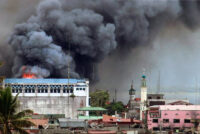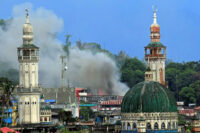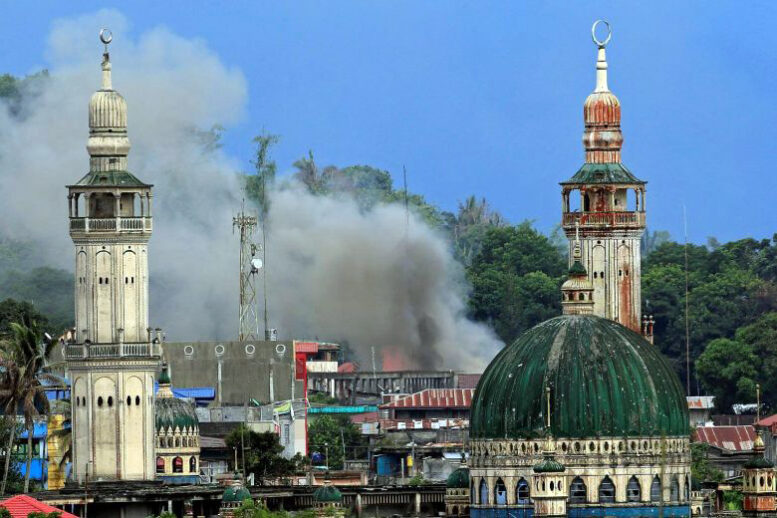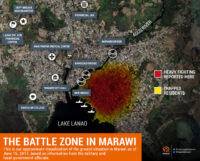Prevailing Conditions
The need to strengthen urban areas has been considered among the most vital considerations in securing the country from terrorism, crime and violence. This is to underscore the fact that urban areas are the centers of the political and economic activities wherein the legitimacy of the country’ s existence and the ability to perform the mandate of governance must be fully secured both from the physical and non-physical threats that endanger society.
The magnet of attraction created by the political and economic centers is difficult to ignore for migrants from the rural areas who are not transient visitors but permanently seeking jobs in urban areas. More often, these people end up as squatters with their families, living under inhuman conditions thereby adding to the congestion of the city populace and creating fertile ground for criminality. Urban centers are favorite and primary sources of illegal funds through bank robberies and kidnappings. The complexities and indifferent attitude of people in the cities are perfect haven for criminals and terrorists.
This paper is a contribution to the overall effort to come up with an action plan and implementing strategy to secure urban communities. It also provides platforms where pre-emptive solutions or approaches can be developed to decongest urban centers thus discouraging migrants from the rural areas. Strategy is proactive that must consider long range approaches to address future implications. It must include all aspects of crime prevention, economic development, and social reforms so that the growing magnitude of criminalities, violence and disorders can be reduced or minimized.
- Some Fundamental Principles, and Doctrines of Security and Urban Defense.
- “ The primary duty of Government is to serve and protect the people. The Government may call upon the people to defend the State, and in the fulfillment thereof, all citizens may be required, under conditions provided by law to render personal, military or civil service.” (Sec. 4, Art. II of the 1987 Constitution).
- Every person has the right to property where the most sacred property is life and honor. Self-defense is paramount and recognized by law.
- “The right of the people to information on matters of public concern shall be recognized…” (Sec. 7, Art. III, Bill of Rights). Hence, the people must have access to information that endangers society that they may be prepared for self-defense and security without having to wait for police or government.
- Economics of Communized Policing. A movement from public policing (where all law enforcement and policing duties are under the government forces) toward private or citizen policing within the bounds of law. Citizen involvement especially in the prevention aspects and pre-emptive endeavors are ideally developed. Example: Patrol 117; Citizens watch and voluntary civic duties. Education and reorientation programs for citizens must be done.
- Trust-Confidence by the Citizens to the Police. An earned reputation and credibility of the police as legitimate protector, law enforcer and partner of the people. Do citizens fear or trust our police?
- Policing through Communitarianism and Consent. Communitarianism is an acronym for community spiritualism; being a model citizen deeply involved in community activities to ensure a peaceful environment; to contribute to the healthy and progressive neighborhood system with public safety as its main objective. As a communitarian, you are involved in action results program (not mere thoughts and words) to make your community safe. It is an anchor to the If this is imbibed in the heart and mind of every citizen, then policing is not difficult. A voluntary engagement between the citizens and police. The community through this reinforcing partnership (like husband-wife relationship) is a vital source of information about criminals, illegal activities, and potential threats to society. This is to remove “a dichotomized thinking” that the local officials primarily represent civil authorities; and that the military or police are the ones responsible for handling civil disorder, insurgency and terrorism.”
- The local government leaders are the primary officials responsible for peace and order. The police are under their supervision. The police station commander is the executive officer under the mayor.
The government cannot provide soldiers or police in all parts of the country for security; hence the need to establish a nucleus of local defense force utilizing all able-bodied citizens under the supervision of the territorial force (PNP) through the general direction of the local government units (LGUs). Communitarianism is the underlying doctrine here. AFP reservists, retired military/police/fire/jail, and law enforcement personnel like the National Bureau of Investigation (NBI), to include company guards, good citizens and volunteers, must be fully organized as the secondary force component, with police and military as primary forces.
- National Unity (words, actions, and support) against terrorism and criminality. National and local government officials are sworn persons to defend the Constitution. They are not there to play personal vested politics to glamorize (or protect) the enemies of the state nor denounce the actions of the military or police against criminals or terrorists. They are the primary source of morale and will to fight by our military and police. (Some government officials are perceived to have an alliance with the rebels or terrorists.)
- Glamourizing the rebels and enemies through the media is a counter-productive practice that emboldens the criminals and terrorists to justify their unlawful actions.
- Professional jealousy and competition for credit (which are prevalent among the military and law enforcement agencies) must be stopped and rectified. The role of the territorial forces and organized home defenses through the local government must be established once the area has been cleared to avoid a vacuum for the rebels to retake or
- Negotiation with an ideological enemy and terrorists is a sign of psychological weakness. “To adhere to peace but remain weak is self-treason.” You cannot pamper the enemy. Fighting the terrorists and rebels is fighting a war. They are not ordinary criminals but ruthless enemies of the state without accountability or moral conscience. Truce or ceasefire only favors the enemy.
- In an impoverished society which is a perfect breeding ground for insurgency, we cannot and must not allow dangerous ideology against a democratic way of life to prosper or develop, much more to protect such idea under the guise of freedom of thought; “a mortal combat in an open market of ideas.”
This is self-defeating chivalry that a struggling country like the Philippines cannot afford to adopt. “If we are to stop a flowing water from the mountain, where shall we put the barrier –down or at the source?”
President Duterte has given a stern warning to some schools and universities for communist groups to stop their recruitment activities targeting students to join the communist movement.
- For 50 years, we have been fighting the rebels, but we have been protecting the breeder of these rebels…” This is irrationality, if not madness!
- Let us align with our allies and be consistent with our commitment. Rebels and terrorist groups have been declared as terrorists by the superpowers, but we beg to disagree with them. Psychologically, we have manifested our defeat and perpetual humiliation. Do we not have the political will to be strong? Have we internalized the meaning of power? We cannot even agree and have one voice. We appear to be divided!
- Major Operational Factors and Environmental Realities
- Cities and urban areas are the centers of the government economic and political activities. The rule of law must prevail to maintain civil order, and governance to sustain. They are the major targets of terrorism.
Terrorism is to create a climate of destabilization and collapse to humiliate the government and characterize it as inutile or incapable to protect the citizens. When urban centers collapse, the entire country will collapse. The government cannot project strength or power if it is crippled or weak from within the center of power – the urban center. “Terrorism is the systematic use of terror especially as a means of coercion. An act of violence or threat thereof intended or calculated to provoke a state of terror in the general public; a particular group of persons with a political agenda:
- The United Nations through the superpowers have listed the following causes and insights of global terrorism:
- Enmity, hatred, frustrations that create and inspire terrorists to commit even to offer their lives. Religious beliefs and indifference.
- Poverty is the root cause; imbalance of wealth brought about by ignorance and fanaticism, envy and jealousy. There is hope in universal misery. Poverty abets terrorism and conversely terrorism breeds poverty.
- Misery, frustration, grievance, despair that cause some people to sacrifice human lives including their own in an attempt to effect radical change.
- Conventional responses designed to address previous kinds of conflict are irrelevant, and will not work.
- No borders/moral, ethical or legal boundaries. No respect for any station in life. No sector of society is spared. Society is the whole target. Time is boundless; and is enshrined in the heart and soul of terrorists/ practitioners, i.e., promising reward after death.
- Satanism in a different form in the 21st century (vis-à-vis, Nazism, and Communism).
- The United States of America (USA) demands for pre-emptive attack as a solution, i.e., to destroy the monster before it takes its victim.
- Popularity and orientation, common in the breeding society of Islam.
The Anti-Terrorism Law of 2020 authored by Senator Panfilo Lacson is a powerful weapon against terrorism, has finally rectified the old and ineffective Human Security Act of 2007 that had been giving more comfort, protection and advantage to the terrorists.
- Urban centers are dependent on the food, resource supply, and products (to include industrial) from the countryside. If the countryside is open and controlled by the rebels and insurgents, the urban centers are strangled; the factories and businesses are being pushed toward the urban centers, hence migrant workers flock to the cities and add to congestion and squatting.
- The countryside must be protected and safeguarded by the territorial forces supported by the military and the people. The PNP (regional and provincial) mobile forces must be the office of primary responsibility (OPR) to continuously patrol the countryside to clear the area from the control of insurgents. When industrial peace and security are established through extended perimeter defense, then factories and businesses can prosper. This will result in “magnetizing and frontiering toward the countryside;” hence decongesting the urban centers. The PNP Special Action Force (the SWAT-oriented force) shall be the strike force in the urban areas.
- The territorial forces (PNP/BJMP/BFP) must be augmented by the citizen volunteer forces organized and composed of the AFP reservists, personnel, company guards barangay officials, volunteer citizens (especially with licensed firearms) under the control and management of the local PNP through the mayors. In this regard, liberalization of firearms licensing and renewal must be encouraged. Areas of responsibilities and other obligations or duties must be specified. A scenario or mobilization must be conducted on a periodic basis to outline the defense and offensive campaign. Household members and school children must be indoctrinated and educated.
- Mandatory coordination and exchange of (intelligence) information or sharing of ideas and tactics must be developed by removing compartmentalization and unfounded confidentialities.
The intelligence community must take a primary role, and improve the intelligence gathering and utilization. Former President Gloria Macapagal-Arroyo has expressed concern on this intelligence failure. Nevertheless, we must have the enduring vigilance, to safeguard our plans and intentions. The terrorists and rebels will not attack at the time and place of our choosing. They are cunning and highly motivated fanatics.
- Interlinkages of alarm systems between and among business establishments and vital government installations (like banks) connected with the central operation center of the police and military must be established. One approach is the use of geographical base files or street block labelling displayed on the electronic screen at the operation center to monitor reported criminal activities, and calamities to facilitate quicker and accurate response. Street names and directional signage must be improved.
- A 24-hour duty system for judges/prosecutors be maintained for purposes of issuing warrants, filing of cases within the allowed detention period of suspects especially during weekends and holidays.
- There is an observed minimal background on military or police among the local officials. Few are graduates of the defense college or military schools. They have inadequate background/knowledge on counter-insurgency or crisis management. The national security council and defense college can sponsor a seminar-workshop on national security seminar-workshop among local officials.
- Upgrading the armaments of the local police beyond the traditional police firearms to match the firepower of the rebels and terrorists. LGUs as juridical persons can procure firearms for issue to the local police. Explore donor agencies.
- Additional training on para-military duties together with the citizens volunteer group must be undertaken. This can be done during weekends and holidays. Our local PNP especially in the isolated towns must be reoriented toward military duties and discipline. Complacency and wrong attitude that they are only good for receiving complaints must be rectified. “Civilian in character” has been misinterpreted. Local PNP must at least safeguard their immediate perimeter, and intensify barangay intelligence networking.
- The mayors and governors league must conduct the efforts for an integrated strategy on pooling of resources, and expertise through a unified planning and implementing task force. This includes big companies and multi-national corporates in the area. The more we rely externally for security, the more insecure we become. Self-reliance within our own capabilities and resources must be explored to the maximum.
Democratic Ideals in a Developing Country
Our country adheres to the democratic way of life following the ideal system of developed countries where poverty is not a major problem. Poverty which a primary cause of terrorism is a continuing problem of the government against the backdrop of uncontrolled population 35 years ago; we were 58 million people that had increased to over 109 million in 2020. Food supplies from the country side are decreasing, affected by frequent calamities; hence, affecting seriously the food requirements in urban centers.
The nation’s security & survival is confronted by several forces of destabilization caused by growing criminality and illegal drugs that destroy society. But the more serious threat is terrorism attributed to the different terrorist groups especially in the southern part of the country carried by the Muslim rebels and criminal elements. The secessionist movement has been a great problem of the government that is threatening to split the republic. This is being aggravated by the popular desire of some politicians advocating federalism that will make this country impoverished and cater to the desires of the insurgents, rebels, and greedy politicians.
Certainly, chaotic situations will prevail amidst overlapping levels of government. Shall we aggravate the more confused confusion? In a developing country, the primary national security (NS) forces are combined military and police. The problem is more of internal where the military is the leading agency with partnership with the police. The 1987 Constitution provided for the creation of national police that is civilian in character; hence, removing the former Philippine Constabulary (PC) from the AFP. This was a product of emotional sentiments of the victims of Martial Law where the PC was the primary implementer of Martial Law. Unknowingly, this was a home run victory of the communist and insurgents. It has emasculated the government operational effectiveness against insurgency especially the secessionist problem in Mindanao.
The rigid and independent set up of the PNP as separate from the AFP was not only a dissipation and reduction of limited power but a wastage of resources and operational capability. In South America (Chile, Argentina, Brazil), the police while a separate agency is associated with the military at all times. Accordingly, it would take at least a hundred years for them to be separated from the military when the country attains a status of a ‘highly developed’ country. They have cited the parallel condition of the Philippines, and that the abolition of the PC was a big blunder; aggravated by a non-consistent provision, i.e., “renouncing war as an instrument of national policy.”
A former defense secretary was arguing with our policy makers, that the enemy was inside our garage and yet we were debating to fight back due the inconsistent provision on renouncing war as an instrument of national policy. Only in our country has this kind of provision which is designed to weaken us and remain subservient. An expert in national security from the US has fully emphasized this and said it would be much better if we removed this provision. And yet we went to fight in Korea and Vietnam Wars in violation of this provision!
RECOMMENDATION
Mandatory Coordination and Joint Action in all Operational Tasks by the Military and Police.
Refusing to learn from the blunders of the past is a stubborn, vain and arrogant behavior dictated by the greed for power and monopoly of credit-recognition. The unfortunate blunder of the sensational ‘Oplan Exodus’ that resulted to the slaughter of 44 PNP Special Action Force (SAF) by the MILF on 25-January-2015 at Mamasapano, Maguindanao was considered “the biggest loss of government elite force in history.” It was purely a PNP operation without the participation of the AFP. This was repeated in a mis-encounter on 29-June-2020 where four military intelligence operatives were gunned down by the PNP troops in Sulu. Two of them were Major Marvin A. Indammog (PMA Class 2006) and Captain Irwin B. Managuelod (PMA Class 2009). As per the report, the military intelligence operatives did not coordinate with the PNP troops and instead sped up when confronted by the PNP. Many serious blunders had happened in the past but we have refused to learn from the mistakes. No amount of words and medals or compensation to the victims and their families can compensate. Like a ’ningas cogon grass’ burned easily and forgotten, many similar blunders in the past have been committed by both the military and police due to a rigid professional jealousy and stiff competition for credit.
The required coordination between the military and police cannot be achieved by a mere operational standard operating procedure (SOP). A need for a higher authority directing the Chief of Staff of AFP and the PNP Chief must be created under the direction of the President who is the commander-in-chief of all armed forces of the Philippines. A Presidential Executive Order (PEO) directing the CSAFP and PNP Chief for mandatory and joint operational action in all national security problems in order to attain a maximum effectiveness and optimal utilization of manpower, intelligence and available resources is the immediate solution. This is urgent and can be done immediately. The AFP and PNP have both legal and doctrine development offices that must attend to this mandatory requirement.
Dynamics of Terrorism
The dynamics of terrorism has been properly identified through the basic definitions both of local and international concerns. The causes and insights are explained. This paper has advanced some pointers to address terrorism toward protecting urban communities in society and country as a whole.

A building in urban Marawi City is set ablaze by airstrikes carried out by Philippine Air Force and Philippine Navy’s Naval Air Group. Photo by Mark Jhomel.

Smoke billows are seen as government troops continue their assault against insurgents from the Maute group (The Straits Times). Photo credit: Reuters.
The fundamentals of public order in society underscore that a civilized society is characterized by the existence of law and order. Without the rule of law, chaos is imminent and disorder prevails. Indeed, no government can long exist as a viable entity amidst lawlessness and chaos, which are conducive to the creation of anarchy.
Our motto: “Fight terrorism and win!”
About the author: Brig. Gen. Chris Rebaño Francisco (PNP Ret). A professional for more than five decades in military & defense, civil government, civilian sector, academe, real estate; and an educator. A consistent scholar and honor graduate, he holds a PhD in Criminology, Master of Science in Operations Research & Systems Analysis, Masters in National Security, and an MBA. He authored books and publications on defense/national security, policing education, operations research, and literary fields in poetry and technical writing. He is a 4th degree Knight of Rizal. In 1976, he graduated from the United States Naval Postgraduate School in Monterey, California. He graduated from the Philippine Military Academy, Class of 1968. He was born in Kalibo, Aklan.

